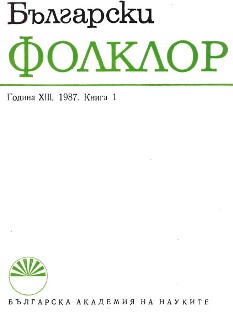По въпроса за българските и полските народни вярвания – опит за сравнение
To the Question of Bulgarian and Polish Folk Beliefs – an Attempt at Comparison
Author(s): Krzysztof WrocławskiSubject(s): Anthropology
Published by: Институт за етнология и фолклористика с Етнографски музей при БАН
Summary/Abstract: The article is aimed at studying and comparing the Bulgarian demonic beings of navi, or navyatsi and the Polish topiec, or topielec, which are believed to originate from the (violent) death of still unbaptised children, or, as is evident from the Polish material, from children cursed by their mother (parents). Applying the theory of the semantic text analysis, the author distinguishes the following semantic roles: agent, and animate recipient of the action. The comparisons are carried out according to several features: (a) identity of the relation between agent and recipient (agens/patiens); (b) basic function of the demon; (c) manner of action of the demon; (d) outward appearance and behaviour; (e) precautions taken against the demon. The Bulgarian folk beliefs about the navi here considered may be regarded as a three-phase model: (1) origin of the demons; (2) actions of the demons; (3) protection from the demons. The Polish tale of the drowned demon analysed here appears to be a two-phase model: (1) the demon takes the people to his (the other) world (=deadening them); (2) the people take the demon to their world (=bringing him back to life). The interpretation of the Bulgarian and Polish folk beliefs here considered allows also for some conclusions to be drawn as to the folk ethics.
Journal: Български фолклор
- Issue Year: XIII/1987
- Issue No: 1
- Page Range: 9-16
- Page Count: 8
- Language: Bulgarian
- Content File-PDF

